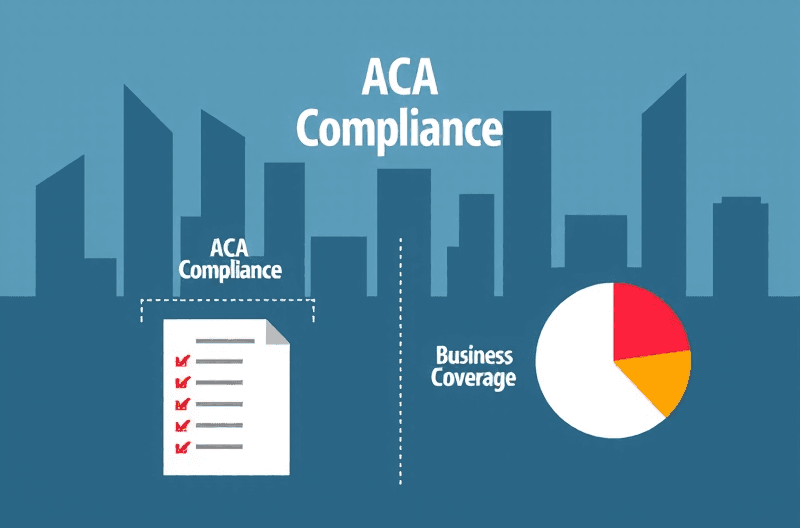Avoid Penalties: 10 Essential Tips for ACA Compliance in 2024
- October 10, 2024
- Posted by: admin
- Category: ACA & Compliance

ACA compliance—following Affordable Care Act requirements—is crucial to avoid penalties and meet legal obligations. Since the ACA’s introduction, it has set standards for employers on offering coverage, affordability, and reporting. Navigating these rules can be complex, but staying compliant protects your business and your employees. This guide covers employer mandates, reporting (Forms 1094-C/1095-C), affordability, minimum value, and practical steps to remain compliant.
What is ACA Compliance?
ACA compliance refers to the employer responsibilities under the Affordable Care Act: offering minimum essential coverage (MEC) to full-time employees and their dependents, ensuring the offer is affordable and meets the minimum value standard, and completing required IRS reporting. Failing any of these can trigger penalties or IRS notices. Understanding these terms—and how they work together—is the first step to staying compliant.
Why ACA Compliance is Crucial for Employers
Beyond avoiding penalties, strong ACA compliance improves employee access to care, supports retention, and reduces administrative risk. It also streamlines renewals and minimizes the chance of costly marketplace subsidy conflicts for employees.
Who Must Follow ACA Compliance Guidelines?
Applicable Large Employers (ALEs)—generally those averaging 50+ full-time employees, including full-time equivalents—must comply with the employer mandate. Growing businesses near this threshold should monitor monthly headcount and hours to know when ALE status applies.
Minimum Essential Coverage (MEC) Explained
MEC includes most employer-sponsored group health plans (self-funded or fully insured). Excepted benefits—like stand-alone dental/vision or fixed-indemnity policies—do not count as MEC by themselves. Ensure the plan you offer is a group major-medical plan that qualifies as MEC.
The Employer Mandate: What You Need to Know
ALEs must offer affordable, minimum-value MEC to at least 95% of full-time employees and their dependents. If not, an employer may owe a shared responsibility payment (see penalties below). Coverage strategy should account for variable-hour, seasonal, and new-hire measurement/administrative periods.
ACA Reporting Requirements: Form 1094-C and 1095-C
Use Form 1094-C to transmit ACA information to the IRS and Form 1095-C to report offers of coverage for full-time employees. File electronically by the IRS deadline (generally March 31 for the prior calendar year). Accuracy matters—incorrect or late filings can trigger separate information-return penalties.
Penalties for Non-Compliance with ACA
- 4980H(a) – Failure to offer coverage to 95%: Annualized penalty of $2,900 per full-time employee (minus the first 30) for 2025 if at least one full-time employee receives a marketplace premium tax credit.
- 4980H(b) – Offer not affordable / lacks minimum value: Annualized penalty of $4,350 per affected full-time employee for 2025.
Only one of these two penalties can apply for a given month, not both. Separate penalties can also apply for late or inaccurate information returns.
How to Track Employee Hours for ACA Compliance
Define full-time status as averaging 30+ hours/week (130+ hours/month). Use look-back measurement methods for variable-hour and seasonal employees. Most employers rely on payroll/HRIS tools or ACA software to track hours, manage measurement/administrative/stability periods, and document offers/waivers.
Determining Affordability for ACA Compliance
For plan years beginning in 2025, coverage is generally considered affordable if the employee-only premium for the lowest-cost minimum-value plan does not exceed 9.02% of household income (the 2024 threshold was 8.39%). Employers typically rely on IRS safe harbors below:
| Safe Harbor | How It Works |
|---|---|
| W-2 Wages | Employee-only cost ≤ 9.02% of Box 1 W-2 wages for the calendar year (for plans beginning in 2025). |
| Rate of Pay | Hourly rate × 130 hours × 9.02% sets the monthly max employee-only contribution (for 2025). |
| Federal Poverty Line (FPL) | Employee-only cost ≤ 9.02% of monthly FPL (for 2025), creating a simple fixed cap. |
Also consider pre-tax premium strategies via a Section 125 Cafeteria Plan to enhance affordability and employee tax savings.
What is Minimum Value Standard (MVS)?
A plan meets minimum value if it covers at least 60% of the total allowed cost of benefits for a standard population and includes substantial inpatient and physician services. Use the HHS Minimum Value Calculator or an actuarial certification for non-standard plan designs.
ACA Compliance for Small Businesses
Employers with fewer than 50 full-time/FTEs are not subject to the employer mandate but may still offer coverage to compete for talent. Options can include traditional small-group plans, QSEHRA, or defined-contribution strategies. As you grow toward ALE status, implement hour-tracking and measurement periods early.
FAQs
What happens if my business does not comply with ACA regulations?
Penalties may apply under 4980H(a) or 4980H(b) if at least one full-time employee receives a marketplace subsidy, plus potential information-return penalties for reporting errors.
How do I know if my business qualifies as an Applicable Large Employer (ALE)?
You’re an ALE if you average 50+ full-time employees including FTEs in the prior year. Recalculate annually and monitor growth.
What forms must I file to report ACA compliance?
ALEs file Forms 1094-C/1095-C. Electronic filing is generally due March 31 for the prior year.
Is offering health insurance mandatory for small businesses?
No, not under the employer mandate (<50 FTEs), but offering coverage supports hiring/retention and may be structured tax-efficiently.
Can I face penalties if the coverage I offer is not affordable?
Yes. If coverage is unaffordable or fails minimum value and an employee receives a subsidy, 4980H(b) penalties can apply.
How does the ACA impact seasonal and part-time employees?
Use the look-back measurement method to determine full-time status for variable-hour/seasonal employees and manage offers accordingly.
Conclusion
Staying ACA compliant means offering MEC that’s affordable and minimum-value, tracking hours accurately, and filing 1094-C/1095-C on time. For reference materials, see Healthcare.gov and the IRS Affordable Care Act pages.
How Medcore Helps
Medcore Brokerage simplifies ACA compliance with hour-tracking guidance, safe-harbor affordability modeling, and turnkey 1094-C/1095-C support. Visit our ACA Compliance Services page or schedule a FREE ACA compliance audit to identify risks and reduce penalties before renewal.




